817 Search Results for praactical teaching
April 1, 2013
by Robin Parker -
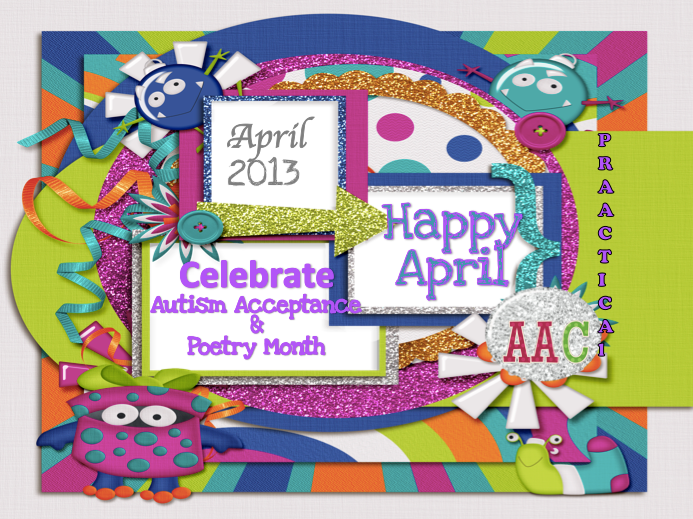
There are a lot of celebrations this month. It is officially Autism Awareness Month. A new name for this that has popped up & taken hold is Autism Acceptance Month. Awareness and/or Acceptance seems to mean different things to different people but hopefully the intent is similar. We hope that this month is filled with great ideas to support ALL people with autism and their families. We hope that educators, clinicians, and whole communities are inclusive, that they presume competence, and that they support communication and language using best prAACtice information and research. We do know that there is more to hope for than just this, like better employment outcomes, more appropriate accommodations, and more individualized support but if focus stays on the former, it seems then that the latter would improve. Plus we have more control (if there is such a thing) on facilitating inclusivity, presuming competence, and of course... [Read More...]
March 26, 2013
by Robin Parker -
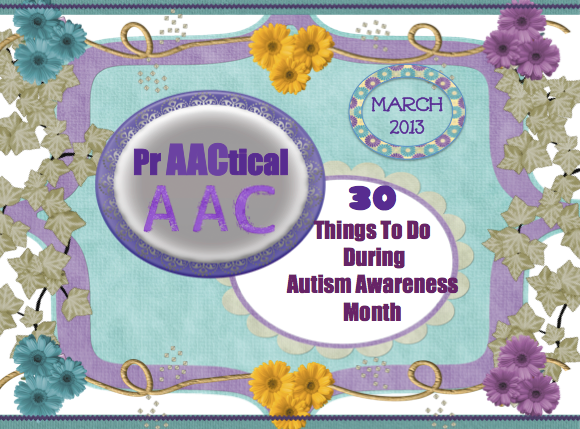
We love getting EVERYONE involved in Autism Awareness/Acceptance Month. We like to take a goal focused approach to our autism activities by choosing projects that facilitate autism awareness & acceptance, positive attitudes, and autism & communication learning. We pass out materials, have contests, go to events, do extra talks, and try and engage EVERYONE we know and even some we do not know. We do a lot of shopping (with small amount of money, but we have to EAT and accessorize). Our families, pets, friends, and students all participate. It is a month filled with purposeful fun. Here are some of the things we will be doing. Please share any activities or projects that you know about. Read & share 5 references that support the use of AAC & Autism (evidence based research) Check out the Online Autistic Carnival which is currently accepting submission of various video documentaries (music, art, writing,... [Read More...]
March 23, 2013
by Robin Parker -
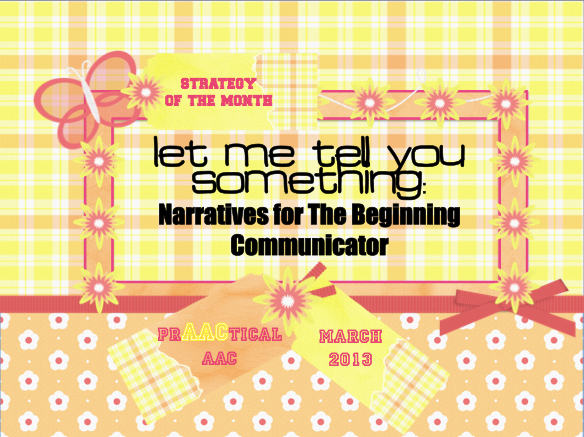
March continues with story telling or narratives as the Strategy of the Month. All learners have stories to tell but some may need special teaching to be able to express their stories. Goals for the beginning communicator can and should include narratives. Personal narratives are a good place to begin but any type of narrative can be taught with structure, routines, partner support, prAACtical strategies. Robust communication includes story telling. Yes, beginning communicators need to be able to express wants and needs however, authentic and comprehensive language involves much more. The quicker we start teaching, the quicker beginning communicators (or anyone) can learn. Beginning Communicator Narratives 3 Types (Just some of the options) Remnant Books are a visual and tactile way of telling stories by recording important events. Learners can help choose items from meaningful personal experiences which serve as a reminder of stories to tell. Create routines and visual supports... [Read More...]
March 16, 2013
by Carole Zangari -
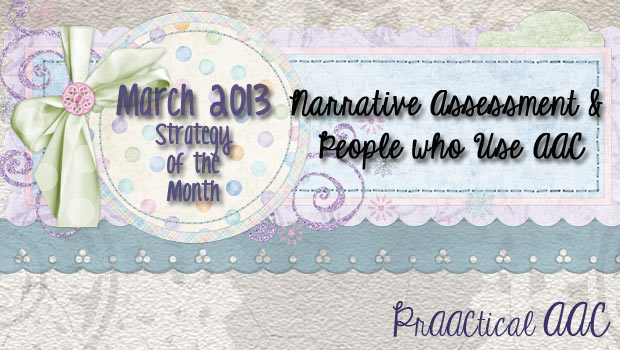
This month, we’ve been talking about building narrative skills in our AAC clients. We tried to build the case that including narrative language goals in our intervention allows us to help people who use AAC to participate more fully in social exchanges, relay more in-depth information, and achieve greater academic success. But how do we know where to start in narrative intervention? And how do we measure progress? In this post, we share some thoughts on the assessment of narrative language in AAC. Most test batteries that assess narrative language are designed to take a snapshot of what the learner has already mastered in terms of telling personal narratives, story retelling, or scripts. This allows us to look beyond MLU, morphology, and grammar and can be useful in determining whether intervention is needed. Some scholars, however, have noted the limitations of this “one shot” approach, particularly for learners whose communication... [Read More...]
March 12, 2013
by Carole Zangari -
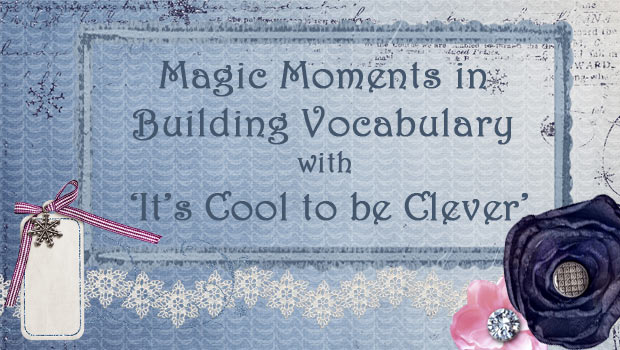
I had such a blast using this great (free) app that I couldn’t wait to get some time to blog about it. ‘It’s Cool to be Clever’ is about being different and uses the story of Edson Hendricks, an innovator who grew up in a small town in Pennsylvania and went on to develop an early design for what we now know as the world wide web. The app is based on a book by a former teacher, Leanne Jones, and contains compelling video and some lovely original music. It was created by Agio Studios. In his own voice, Hendricks tells his personal experiences of growing up feeling different from his peers, family, and community. There are four segments to the app. The Story: Narrated version of Hendrick’s biography, written by Leanne Jones, can be viewed so that you can read on your own, or have it read to you... [Read More...]
March 11, 2013
by Carole Zangari -
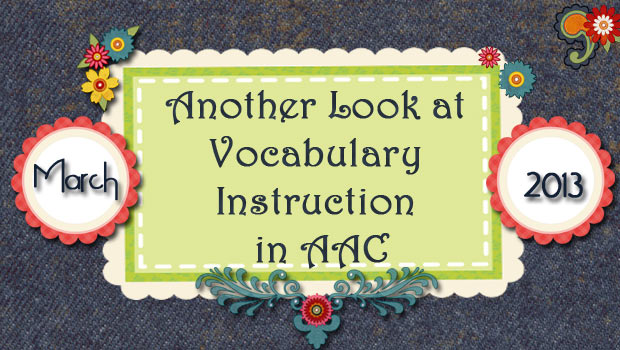
5 Things to Do to See If Your Vocabulary Instruction is Effective (& 5 Things to Do If It’s Not) AACtual Therapy: Fun & Functional Vocabulary with Shareka Bentham In the Treasure Bag: Using Sharing Time to Focus on Vocabulary Why We Love AAC Language Experience Activities 5 Great Sites for AAC Vocabulary Practice Complete Vocabulary Instruction Ideas & Activities Vocabulary Learning Materials & AAC Strategies Explicitly Speaking: Vocabulary Teaching in AAC Choosing a Focus for Vocabulary Instruction Building Word Consciousness: Vocabulary Instruction in AAC Vocabulary Learning Using Infographics Say THIS, NOT THAT to Reinforce Vocabulary Learning How to Use Magnets to Promote Language Development Vocabulary Activities: 5 Sites for Learning with Avatars What Makes a Good Vocabulary Teaching Activity? 4 Things to Look For Ideas about Vocabulary Instruction for the Beginning Communicator 10 Things to Do in Using Focused Language Stimulation in AAC Vocabulary Teaching Tell Me About It:... [Read More...]
March 5, 2013
by Robin Parker -

Strategy of the Month Beyond Requesting: Thoughts on Teaching Information Transfer Beyond Requesting: PrAACtical Scripts to Teach Conversations Beyond Requesting: Thoughts on Teaching Interrogatives Beyond Requesting: Let’s Chat with Peers PrAACtical Thinking Language Experience Surveys: 8 Fun Ideas 14 Valentine’s Day Activities: Love, Literacy, & Learning Flip Book Love Angelman Awareness Day It Gives Me the Feeling of Love Inclusion & Jewish Disability Awareness Month What’s New? VIVIVOCA Math, Science, and AAC The ‘Real’ Pre-requisites to AAC Device Use The Joy of Reading: World Book Day PrAACtical Thoughts About Graphic Organizers AACtual Therapy & How I Do It Teaching the Use of Social Phrases and Comments Fun & Functional Vocabulary Supporting Teachers of Students with AAC Needs Essential Tricks for Supporting AAC in Schools, Part 1 Video of the Week Ted Carr on Challenging Behavior in ASD A Language Lost PrAACtical Puppet Power The Importance of Using Visual Supports Conference... [Read More...]
March 2, 2013
by Carole Zangari -
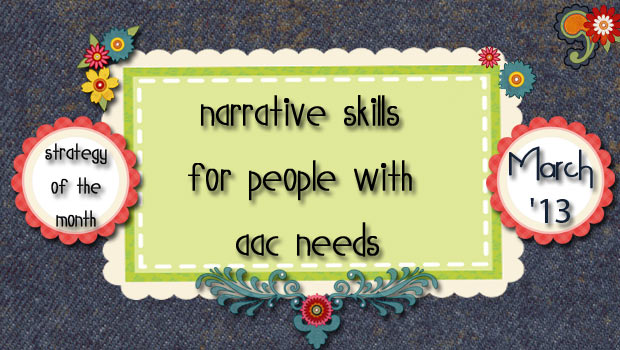
This month, we’ll share some thoughts about helping people with AAC needs develop narrative skills. Why narrative skills? Because they help us connect to one another and communication learning works best when we feel connected. Among other things, storytelling helps us relate to one another. Narrative language is important for reading and writing skills to develop. It helps us understand the world and ourselves. In telling our stories, we establish our identities. Plus, it’s part of what makes life fun. In the US, pediatric therapists are having lots of conversations about the Common Core State Standards (CCSS) in English Language Arts (ELA), and how they relate to the IEP goals of the students that they serve. Many of the goals in the ELA speaking domain require students to be able to summarize what they hear and read, so it is no surprise that SLPs are prioritizing narrative language and related... [Read More...]
February 23, 2013
by Robin Parker -
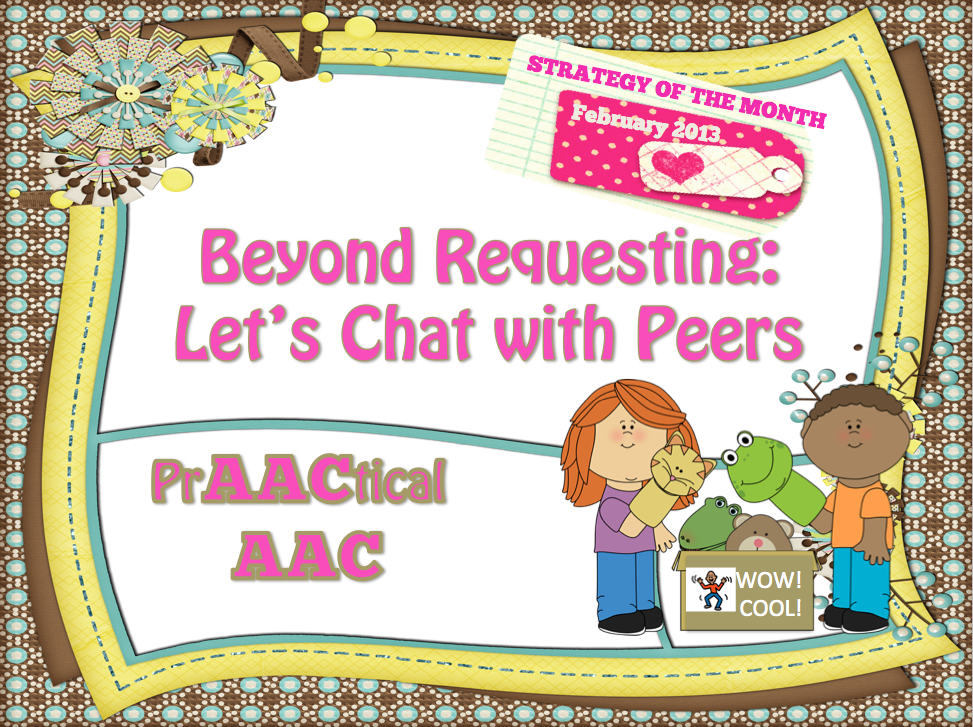
As we wrap up the February Strategy of the Month, we need to add strategies for helping AAC users talk/chat with peers. For some learners, it is more about providing access and opportunity while for others, it is more about providing a platform for the social awareness and exchange. However, for all learners who need assistance in ‘chatting’, there are many goals and strategies that will help. Setting the Foundation for Social Exchanges with Peers Provide frequent opportunities for peers to communicate with each other- Build in many opportunities within all (or almost all) activities for generic small talk, gossiping, & chatting. Create activities that have’ built in’ communication with peers- develop activities that require communication with peers to make the activity work. Instead of having all communication directed at the adults/facilitators in the room, have the learners talk to peers to take steps in the activity. Set up... [Read More...]
February 22, 2013
by Carole Zangari -
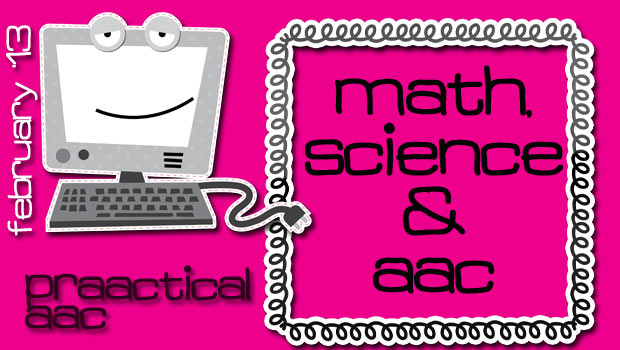
In an earlier post, we began sharing content on AAC and inclusion based on articles from ASHA’s Special Interest Group (SIG) quarterly publication, Perspectives on AAC. Although the final versions are available only to SIG members, clearance has been given to post the original articles. Today, we are pleased to share the work of Michele Boruta and Kara Bidstrup. In this article, they discuss a process for using standards‐based math and science curricula to build the linguistic competence of students who use AAC. In the US, there is an increasing focus on using the curriculum as the launching point for all IEP-driven intervention. Though the mandate for using curricula as the context for therapies is not new, many SLPs are still getting comfortable with this approach. We hope this article provides some prAACtical guidance for therapists who are striving to integrate AAC teaching with curriculum content. Thank you to Ms.... [Read More...]









